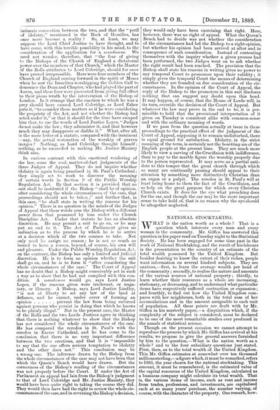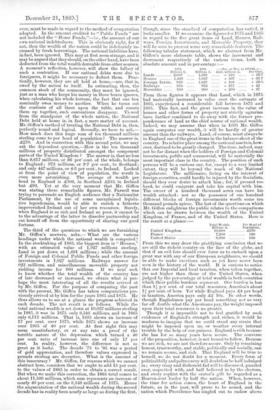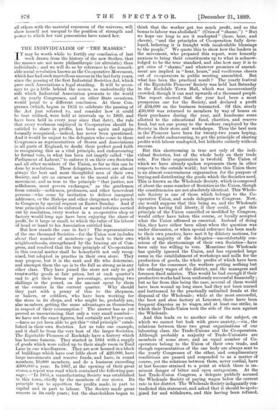NATIONAL STOCKTAKING.
WHAT is the nation worth as a whole ? That is a question which interests every man and every woman in the community. Mr. Giffen has answered this question in his paper read on Tuesday night to the Statistical Society. He has been engaged for some time past in the work of National Stocktaking, and the result of his labours is the presentation to the country of an estimate of the total wealth possessed by the United Kingdom. But besides desiring to know the extent of their riches, people want information on several kindred subjects. They are anxious,—first, to learn the average wealth per head of the community ; secondly, to realise the nature and amounts of the various sources of national property ; thirdly, to learn whether their resources as a whole are increasing, stationary, or decreasing, and to understand what particular items have respectively suffered contraction or expansion ; and fourthly, to find out how the United Kingdom com- pares with her neighbours, both in the total sum of her accumulations and in the amount assignable to each unit of population. All these points are dealt with by Mr. Giffen in his masterly paper,—a disquisition which, if the complexity of the subject is considered, must be declared to be one of the most remarkable studies ever produced in the annals of statistical science.
Though on the present occasion we cannot attempt to reproduce the process by which Mr. Giffen has arrived at his results, we propose to give the general answers furnished by him to the question,—What is the nation worth as a whole ? and to the four subsidiary questions just stated. First, then, as to the total wealth of the United Kingdom. This Mr. Giffen estimates at somewhat over ten thousand millions sterling,—a figure which, it must be remarked, refers to 1885, the year chosen for the national stocktaking. This amount, it must be remembered, is the estimated value of the capital resources of the United Kingdom, calculated as a business company might calculate its total wealth. That is, the various items of income, such as rent and income from trades, professions, and investments, are capitalised each at so many years' purchase, the number varying, of course, with the character of the property. One remark, how- ever, must be made in regard to the method of computation adopted. In the amount credited to "Public Funds" are not included the "Home Funds,"—i.e., the amount of our own national indebtedness. This is obviously right, for if not, then the wealth of the nation could be indefinitely in- creased by fresh borrowings. The national liabilities have, in fact, been ignored. This may at first seem strange, and it may be argued that they should, on the other hand, have been deducted from the total wealth derivable from other sources. A moment's reflection, however, will show the fallacy of such a contention. If our national debts were due to foreigners, it might be necessary to deduct them. Prac- tically, however, they are all held at home,—are, that is, owed by the nation to itself. In estimating, then, the common stock of the community, they must be ignored, just as a man who keeps his money in three boxes ignores, when calculating his whole fortune, the fact that one box nominally owes -money to another. When he turns out the contents of all three upon the table, and counts them up together, such conventions disappear. Viewed from the standpoint of the whole nation, the National Debt held at home is, in fact, a mere matter of account. Mr. Giffen's method of treating the National Debt is, then, perfectly sound and logical. Secondly, we have to ask,— How much does this huge sum of ten thousand millions sterling come to per head of population ? The answer is, £270. And in connection with this second point, we may ask the dependent question,—How is the ten thousand millions of property distributed amongst the component parts of the United Kingdom ? The answer is, that no less than 8,617 millions, or 86 per' cent. of the whole, belongs to England ; 973 millions, or 9-7 per cent., to Scotland ; and only 447 millions, or 4-3 per cent., to Ireland. Looked at from the point of view of population, the result is even more astonishing. The average of wealth per head in England is £308, in Scotland £243, in Ireland but £93. Yet at the very moment that Mr. Giffen was stating these remarkable figures, Mr. Parnell was trying to persuade an English audience that a Nationalist Parliament, by the use of some unexplained legisla- tive legerdemain, would be able to enrich a hitherto impoverished Ireland out of her own resources. Surely, when England is so rich and Ireland so poor, it cannot be to the advantage of the latter to dissolve partnership and cut herself off from the opportunity of sharing our good fortune.
The third of the questions to which we are furnishing Mr. Giffen's answers, asks,— What are the various headings under which the national wealth is computed ? In the stocktaking of 1885, the biggest item is "Houses," with an estimated value of 1,927 millions sterling. Land is put down at 1,691 millions ; while the amount of Foreign and Colonial Public Funds and other foreign investments is 1,027 millions. Railways answer for 923 millions, and miscellaneous moveable property not yielding income for 960 millions. If we next seek to know whether the total wealth of the country has of late decreased or increased, we obtain what is per- haps the most interesting of all the results arrived at by Mr. Giffen. For the purpose of comparing the past with the present, Mr. Giffen has taken computations pre- viously arrived at by him for the years 1865 and 1875. He thus allows us to see at a glance the progress achieved in each decade. The net result is as follows. While the total national wealth is set down at 10,037 millions sterling in 1885, it was in 1875 only 8,548 millions, and in 1865 only 6,113 millions. That is, 1885 shows an increase of 17 per cent. over 1875, while 1875 shows an increase over 1865 of 40 per cent. At first sight this may seem unsatisfactory, or at any rate a proof of the terrible nature of the depression which turned a 40 per cent. ratio of increase into one of only 17 per cent. In reality, however, the difference is not so great as it looks. The decade '75 to '85 was a period of gold appreciation, and therefore values expressed in pounds sterling are deceptive. What is the amount of this inaccuracy ? Mr. Giffen, for reasons which we cannot abstract here, considers that we ought to add 15 per cent. to the values of 1885 in order to obtain a correct result. But when we make this correction, the 1885 total comes to about 11,500 millions, which sum represents an increase of nearly 40 per cent, on the 8,548 millions of 1875. Hence the augmentation of the national wealth during the second decade has in reality been nearly as large as during the first, though, since the standard of computation has varied, it looks smaller. If we examine the figures for 1875 and 1885 in regard to the five great items of Land, Houses, Rail- ways, Foreign Investments, and Moveable Property, they will be seen to present some very remarkable features. The following tabular statement, which we abstract from Mr. Giffen's more elaborate table, shows the increment and decrement respectively of the various items, both in absolute amount and in per-centage 1875. 18F5. or Dec. in 1875-85.--, Millions C. .C. Amt. millions 5. Per Cent.
Lands 2,007 1,691 — 316 — 151 1,927 Houses 1,420
++ 21507087 + 35.7.
Foreign Invsts. 919 1,027
Railways 655 932 + 26.5,
+ 7 + 42 Moveables 700 960 + 37 + 260
From these figures it appears that Land, which in 1875- had materially increased in value over the estimate of 1865, experienced a considerable fall between 1875 and 1885. This fact, and the great increase in the value of houses and other forms of property not strictly agrarian have further combined to do away with the former pre- ponderance of land as the chief source of national wealth. Indeed, we may assume that when in 1895 Mr. Giffen again computes our wealth, it will be hardly of greater amount than the railways. Land, of course, must always be in England one of the great items in the balance-sheet of the country. Its relative place among the national assets is, how- ever, destined to be greatly changed. The time, indeed, may not be far distant when the holders of Foreign and Colonial investments, public and commercial, will be materially the most important class in the country. The position of such persons will be a curious one, for, except to a very limited extent, they will be beyond the reach of the National Legislature. The millionaire, living on the interest of foreign securities, could hardly be injured by the Socialists, should they ever desire to attack him ; for, if pressed too. hard, he could emigrate and take his capital with him. The owner of a hundred thousand acres can have his wealth attached : not so the possessor of one hundred different blocks of foreign investments worth some ten thousand pounds apiece. The last of the questions on which Mr. Giffen enlightens the public relates to the comparisons which can be drawn between the wealth of the United Kingdom, of France, and of the United States. Here is the result at a glance :— Total Wealth. Per Head of Millions 2. Population..
United Kingdom 10,000 .270 France 7,200 190 United States 8,000 160
From this we may draw the gratifying conclusion that we are still the richest country on the face of the globe, and that if an evil fate should ever force us to embark upon a great war with any of our European neighbours, we should be able to make exertions such as yet have never been seen in the history of the world. It is curious to notice- that our Imperial and local taxation, when taken together, are not higher than those of the United States, when by the per-centage of total wealth in both countries which their public burdens represent. Our burden is less than 1-1 per cent. of our total resources, America's about 11 per cent. of hers. Yet while England pays £4 per head- in taxation, America pays only £2 10s. In other words,. though Englishmen pay per head something not so very- far off double what the Americans pay, the weight imposed upon their total resources is no greater.
Though it is impossible not to feel gratified by such evidences of England's strength and riches, it would be madness to imagine that we could stand any strain that might be imposed upon us, or weather every internal trouble by the help of our guineas. England is rich because she has for so many years been secure. The converse- of the proposition, however, is not bound to follow. Because- we are rich, we are not therefore secure. Only by remaining- honest, trustworthy, and stable, politically and socially, can we remain secure, and rich. That England will be true to herself, we do not doubt for a moment. Every form of politicalfolly and poltroonery will doubtless be half indulged in ; every crazy and dishonest fad will he discussed, puzzled over, coquetted with, and half believed in by the electors, and every sophist with the orator's gift be regarded as a Heaven-sent leader by half the nation. When, however, the time for action comes, the heart of England in the future, as in the past, will prove to be sound, and the nation which Providence has singled out to endow above all others with the material resources of the universe, will show herself not unequal to the position of strength and power to which her vast possessions have raised her.












































 Previous page
Previous page